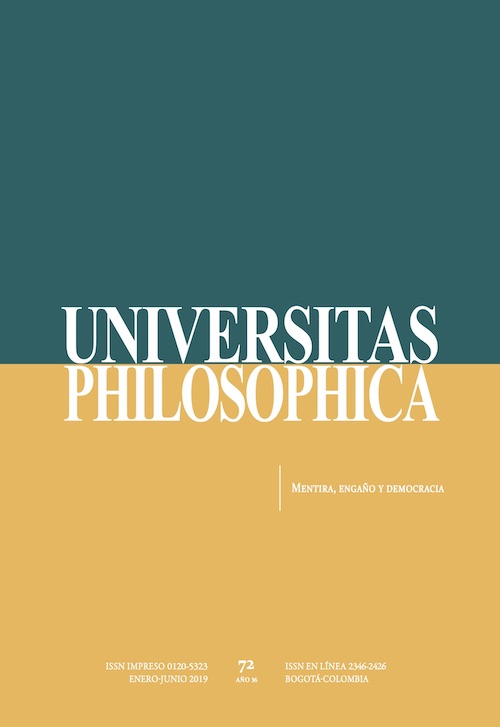Resumen
A tradução de Nietzsche, da teoria da física da matéria, que se depreende da física de Roger Joseph Boscovich para a linguagem de uma atomística sensorial, provoca o desvelamento de vários preconceitos morais. Para Boscovich os pontos materiais são sintomas de uma ação que não é pertencente ao ponto em si, mas se dá à distância, como resultado de um atuar de um ponto A sobre um ponto B e vice versa. Nietzsche, apropriando-se da física de Boscovich, equipara a sua dinamicidade temporal à teoria da sensação. Neste sentido, os pontos sensoriais são providos de ação e toda a ação é uma ação sensorial à distância, como resultado de um atuar de um sobre um outro. Não reconhecer esta diversidade sensorial seria falsear a constituição física dos organismos. Este desreconhecimento não estaria ligado à origem de nossos preconceitos morais?
Abel, G. (1998). Nietzsche: die Dynamik der Willen zur Macht und die ewige Wiederkehr. Berlim: Walter de Gruyter.
Boscovich, R. J. (1922). A Theory of Natural Philosophy. Chicago: Open Court Publishing Company.
Cassirer, E. (1979). El problema del conocimiento en la filosofia y en las ciencias modernas, II. México: Fondo de Cultura Económica.
Deleuze, G. (1976). Nietzsche e a filosofia. Rio de Janeiro: Editora Rio.
Gori, P. (2007). La visione dinamica del mondo. Nietzsche e la filosofia naturale di Boscovich. Napoli: Edizioni La città del sole.
Hesse, M. (1962). Forces and Fields. Mineola: Dover.
Itaparica, A. L. M. (2004). O novo “infinito”: perspectivismo e interpretação. In: V. D. de Azeredo (Org.), Caminhos percorridos e terras incógnitas. Encontros Nietzsche (pp. 97-118). Ijuí: Editora Unijuí.
Janz, C. P. (2016). Friedrich Nietzsche. Uma biografia (Vol. 1). Petrópolis: Vozes.
Marton, S. (2010). Nietzsche. Das forças cósmicas aos valores humanos. Belo Horizonte: UFMG.
Nasser, E. (2008). Nietzsche e a morte. Cadernos de Filosofia Alemã, 11, jan-jun, 99-110.
Nasser, E. (2015). Nietzsche e a ontologia do vir-a-ser. Loyola: São Paulo.
Nedelkovich, D. (1922). La philosophie naturelle et relativiste de R. J. Boscovich. Paris: Éditions de la vie universitaire.
Nietzsche, F. (1979). Sobre verdade e mentira no sentido extra-moral. (Trad. R. R. Torres Filho). In: Os pensadores. Nietzsche. Obras Incompletas (pp. 43-52). São Paulo: Abril Cultural.
Nietzsche, F. (1981a). Briefe von Friedrich Nietzsche Mai 1872 – Dezember 1874. In: Nietzsche Briefwechsel: Kritische Gesamtausgabe Briefwechsel [KGB]. Herausgegeben von Georgio Colli und Mazzino Montinari. Berlin: Walter de Gruyter. Bd. II/3.
Nietzsche, F. (1981b). Briefe von Friedrich Nietzsche Januar 1880 – Dezember 1884. In: R. Muller-Buck & H. Schmid (Eds.). Nietzsche Briefwechsel: Kritische Gesamtausgabe Briefwechsel [KGB]. Berlin: Walter de Gruyter. Bd. III1.
Nietzsche, F. (1999). Sämtliche Werke: Kritische Studienausgabe in 15 Bänden [KSA]. Herausgegeben von Giorgio Colli and Mazzino Montinari. München: Deutscher Taschenbuch Verlag de Gruyter.
Nietzsche, F. (2000). Além do bem e do mal. Prelúdio a uma filosofia do futuro. (Trad. P. C. de Souza). São Paulo: Companhia das Letras.
Ross, W. (1994). Friedrich Nietzsche: el águila angustiada. Una biografia. Barcelona: Paidós.
Tones, M. & Mandalios, J. (2015). Nietzsche’s Actuality: Boscovich and the Extremities of Becoming. Journal of Nietzsche Studies, 46(3), 308-327.
Whitlock, G. R. J. (1999). Boscovich and Friedrich Nietzsche: A Re-Examination. In: B. E. Babich & R. S. Cohen (Eds.), Nietzsche, Epistemology, and Philosophy of Science: Nietzsche and the Sciences II (pp. 187-201). Boston Studies in the Philosophy of Science (Vol. 24). Boston: Kluwer Academic Publishers.
Esta revista científica se encuentra registrada bajo la licencia Creative Commons Reconocimiento 4.0 Internacional. Por lo tanto, esta obra se puede reproducir, distribuir y comunicar públicamente en formato digital, siempre que se reconozca el nombre de los autores y a la Pontificia Universidad Javeriana. Se permite citar, adaptar, transformar, autoarchivar, republicar y crear a partir del material, para cualquier finalidad (incluso comercial), siempre que se reconozca adecuadamente la autoría, se proporcione un enlace a la obra original y se indique si se han realizado cambios. La Pontificia Universidad Javeriana no retiene los derechos sobre las obras publicadas y los contenidos son responsabilidad exclusiva de los autores, quienes conservan sus derechos morales, intelectuales, de privacidad y publicidad.
El aval sobre la intervención de la obra (revisión, corrección de estilo, traducción, diagramación) y su posterior divulgación se otorga mediante una licencia de uso y no a través de una cesión de derechos, lo que representa que la revista y la Pontificia Universidad Javeriana se eximen de cualquier responsabilidad que se pueda derivar de una mala práctica ética por parte de los autores. En consecuencia de la protección brindada por la licencia de uso, la revista no se encuentra en la obligación de publicar retractaciones o modificar la información ya publicada, a no ser que la errata surja del proceso de gestión editorial. La publicación de contenidos en esta revista no representa regalías para los contribuyentes.



